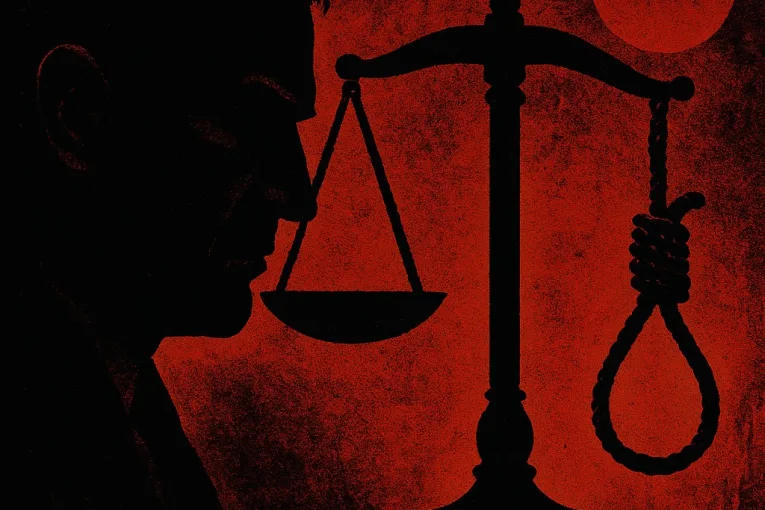
Los Angeles County District Attorney Nathan Hochman wants us to believe that his decision to resume seeking the death penalty isn’t political. It’s just about “upholding the law.”
In a media interview this week, Hochman stated, “The job of the district attorney is not whether or not someone will ultimately be executed. That’s up to the governor. My job is to actually uphold the laws.”
This quote—bland in tone but loaded with implications—was accompanied by a television news clip touting that “L.A. County [will] seek death penalty in extreme cases.”
The reality is that the death penalty is for all intents and purposes dead in California – and all Hochman’s revival will do is cost taxpayers a huge amount of money to put lip service and dressing on a policy.
But let’s be honest, Hochman’s defense of the death penalty isn’t about justice. It’s bureaucratic deflection wrapped in a tidy package as law-and-order duty.
Moreover, Hochman compounds this by outsourcing moral responsibility to the governor while asserting that he’s just doing his job.
In other words, Hochman attempts to hide behind the machinery of the state. But prosecutors are not mere cogs in the system. They wield enormous discretion. Hochman knows this, and his decision to resurrect capital punishment in Los Angeles—after years of movement away from it—is not obligatory. It’s deliberate. It’s ideological. And it’s dangerous.
Hochman wants to roll back the clock on L.A.’s criminal justice reforms, invoking an outdated and deeply flawed punishment as if it’s the only tool available for “extreme” cases.
But the evidence is overwhelming: the death penalty does not deter crime, it doesn’t deliver consistent justice, and it’s applied in racially discriminatory and economically biased ways.
The ACLU’s white paper on the subject exposed a staggering pattern under Hochman’s predecessor—22 people sentenced to death during DA Jackie Lacey’s tenure, all of them people of color.
If Hochman wants to talk about upholding the law, perhaps he should start by acknowledging the law’s long, shameful history of being enforced unequally. Prosecutors in Los Angeles have repeatedly sought the death penalty in ways that reflect systemic racism—not proportional justice. Shouldn’t “upholding the law” include correcting for that?
Instead, Hochman’s announcement is a throwback to the days when prosecutors used death penalty filings as political currency—proof that they were “tough” enough to lead. But L.A. voters have shown time and again they don’t want to be led that way.
In 2012 and 2016, they supported efforts to repeal the death penalty. In 2020, they elected George Gascón in part because he pledged to stop seeking capital punishment. These weren’t flukes; they were a clear repudiation of policies that rely on vengeance over vision.
The Death Penalty Action Coalition (DAAC) got it right in its swift condemnation of Hochman’s decision. As they wrote in a statement this week:
“This is another example of D.A. Hochman returning Los Angeles County to cruel, ineffective, and error-prone policies of the past… We hope DA Hochman steps forward for justice by identifying, confronting, and responding to the true causes of crime, rather than continuing to resurrect failed and cruel policy relics L.A. has already left behind.”
There’s a deeper problem here: Hochman’s statement assumes that “extreme cases” justify extreme punishment. But in practice, who decides what’s “extreme”? History shows that this discretion has overwhelmingly targeted Black and Brown defendants. In fact, as the ACLU found, some of the people sentenced to death in L.A. County were represented by attorneys so incompetent they slept through trial or failed to present a defense at all. Is this the justice Hochman claims to be upholding?
Moreover, the death penalty is exorbitantly expensive. California has spent billions maintaining its death row system, while executions have been functionally frozen for nearly two decades.
Governor Newsom’s 2019 moratorium, along with his dismantling of San Quentin’s death chamber, made clear that the state was stepping away from this punishment. If Hochman knows the governor will not carry out executions, then seeking the death penalty anyway is not about punishment. It’s about power. About political performance. About proving a point.
And that point is chilling: that even in a city as progressive and reform-minded as Los Angeles, the state can still threaten death under the banner of “justice.”
If Hochman were serious about public safety, he’d be investing in the actual tools that reduce crime: trauma-informed services for victims, mental health care, youth diversion, and community violence interruption. These strategies don’t make for sensational headlines, but they actually work. They build safety, not spectacle.
Instead, we get photo ops, cable news hits, and recycled talking points about how the DA is just “doing his job.”
But being district attorney isn’t about doing the job. It’s about redefining what the job means. George Gascón tried to do that—imperfectly, and at times controversially—but with a clear goal: to center equity, rehabilitation, and justice over retribution.
Hochman’s vision? To bring back the most morally and legally indefensible tool in the prosecutor’s arsenal, and then pretend his hands are tied.
They’re not.
And the rest of us shouldn’t let him get away with pretending otherwise.
